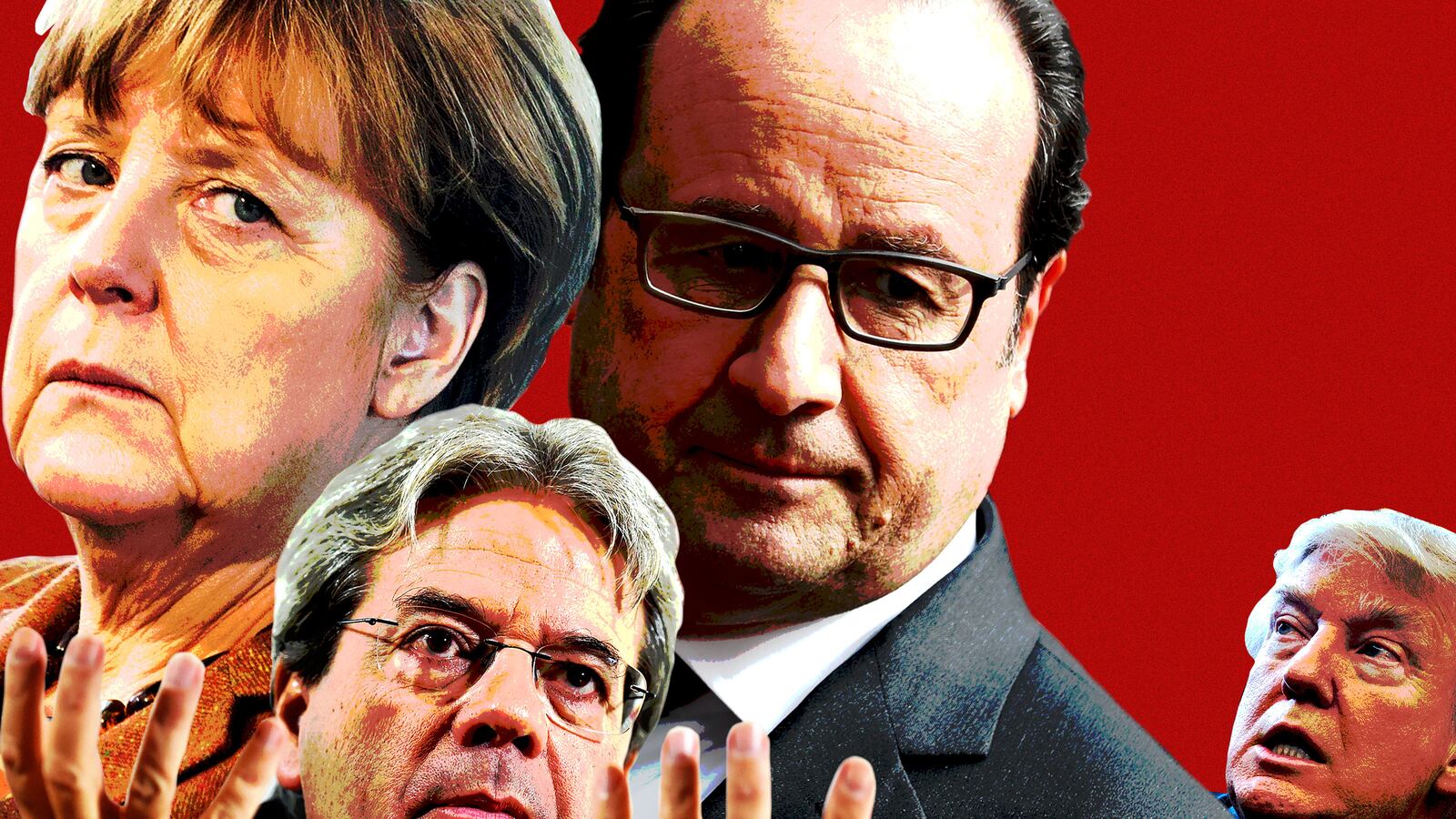ROME—Ah, Malta, that picturesque and oft-forgotten European island out there in the Mediterranean somewhere between Sicily and the coast of North Africa. It’s where Winston Churchill and Franklin Roosevelt met during the waning days of World War II, and on Friday it was once again supposed to be a retreat for high-level decision making.
Between meetings and photo ops, Europe’s leaders there for a summit were given boat rides around the very harbor where thousands of migrants and refugees arrive each year from Libya, just 200 miles away.
Europe’s crushing migrant and refugee crisis was supposed to top the agenda for the one-day meeting. But it soon grew hard to distinguish which threat they considered greater, migrants or Donald Trump.
On the migrant front, on Thursday night before the summit began Italy and Libya reached an agreement that vaguely mirrors one forged by former Italian Prime Minister Silvio Berlusconi and the late Libyan leader Muammar Gadaffi back in 2011. Its aim is to “turn off the spigot” of refugees into Europe, as Gadaffi used to say. It’s not exactly a wall in the water, but, if implemented, the agreement would be a strong deterrent.
The new plan calls for European and Libyan forces to patrol Libyan waters closer to shore so they can turn back migrant ships shortly after they set sail and force them back to the North African coast. In exchange, Italy, with Europe’s backing, would invest €200 million ($216 million) in camps inside Libya where would-be migrants and refugees could be processed or repatriated without having to try to make the deadly to Europe. In 2016, 5,083 people are known to have died in the crossing. Countless others may well have perished without anyone’s knowledge.
“It’s an agreement which strengthens the cooperation between Italy and Libya in many areas,” Italy’s Prime Minister Paolo Gentiloni said Thursday. “There is need for development, stability, reconstruction, rebirth of unity. On the other side the agreement commits Italy to strongly support Libya.”
But just as the European leaders were agreeing to stop migrants and refugees, which, according to aid agencies, would put migrants and refugees at greater risk in potentially lawless Libyan camps, they were also bashing American President Donald Trump for his planned wall to keep out Mexican migrants, his ban on Muslims from many countries, and his meddling in Europe’s already rather messy affairs.
British Prime Minister Theresa May offered to be the “bridge” to help smooth the way between Europe and Trump’s America, which was met with lukewarm response, not least of all because Brexit surely means May’s priority will be smoothing things over for the U.K.
Lithuanian President Dalia Grybauskaite told BBC radio, “I don’t think there is a necessity for a bridge—we communicate with the Americans on Twitter.”
Outgoing French President François Hollande had less than kind words for Trump’s support of Brexit and prediction of the end of the EU. “What is at stake is the very destiny of the European Union. It is unacceptable that there should be, through a number of statements by the U.S. president, pressure on what Europe should be or what it should no longer be,” said Hollande. He emphasized the need for Europe to make sure it had its own mutual defense policies in place “within the framework” of NATO, and said bluntly, “We must protect our commercial interests when they are threatened.”
German Chancellor Angela Merkel called for Europe to stay focused on unity. “I already said that Europe has its destiny in its own hands,” she told reporters upon her arrival in Malta. “And I believe the stronger we state clearly how we define our role in the world, the better we can take care [of] our transatlantic relations.”
Other leaders, like Christian Kern of Austria, called Trump’s travel ban on certain nationlities “highly problematic” and blamed America for its role in creating the tinder box that has become the Middle East. “There is no doubt that America shares responsibility for the refugee flows by the way how it intervened militarily,” he said on the sidelines of the summit.
Maltese Prime Minister Joseph Muscat, the host of the summit for the 28 members of the European Union, echoed concerns about “decisions” and “attitudes” set forth by the Trump administration, but was quick to say there was no hate for the United States as a whole. The basic message to Americans: We don’t hate you, we just hate your president.
“Obviously there was concern among the EU 28 on some decisions that are being taken by the new U.S. administration and some attitudes that are being adopted by the said administration,” Muscat told the summit in his closing remarks. “Nevertheless there was no sense of anti-Americanism. There was a sense that we need to engage with the United States just the same, but we need to show that we cannot stay silent where there are principles involved.”
Trump, who has made no bones about his lack of affection for the European Union might just have done what decades of summits and attempts at unity have failed to do. Europe seems, for the first time in perhaps ever, finally united. But it’s not because of borders or treaties. Europe is uniting in its resolve to stand up to Trump.






